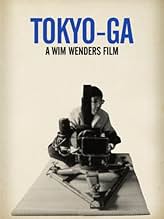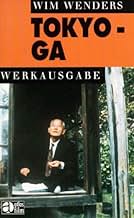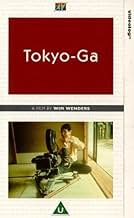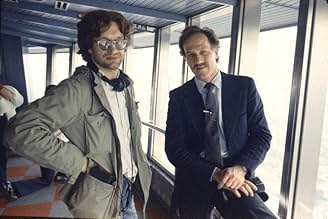VALUTAZIONE IMDb
7,3/10
3883
LA TUA VALUTAZIONE
Mosso dal lavoro del regista Yasujirô Ozu, Wim Wenders si reca in Giappone alla ricerca della Tokyo vista nei film di Ozu.Mosso dal lavoro del regista Yasujirô Ozu, Wim Wenders si reca in Giappone alla ricerca della Tokyo vista nei film di Ozu.Mosso dal lavoro del regista Yasujirô Ozu, Wim Wenders si reca in Giappone alla ricerca della Tokyo vista nei film di Ozu.
- Regia
- Sceneggiatura
- Star
Recensioni in evidenza
This had been on my watchlist for ages, but after watching the excellent Perfect Days, it became a top priority. Both have Wim Wenders exploring Japan, though Tokyo-Ga is a documentary, and one with a surprising focus on Yasujiro Ozu. When Wenders is focused on Ozu, and interviewing people who knew the legendary filmmaker, I think Tokyo-Ga is at its best.
There are other sections dedicated to just exploring technology and life in Japan, but these parts come up a little short at times. Wenders' narration can feel a little surface-level at times, or at least not as exceptional as Werner Herzog's would be, if he handled a film like this (he does have a cameo appearance here though, which was cool).
It's a pretty good watch. It doesn't do for the documentary genre what Perfect Days does for non-documentary films, by any means, but it's still fairly good for what it is, and was relatively interesting to me throughout.
There are other sections dedicated to just exploring technology and life in Japan, but these parts come up a little short at times. Wenders' narration can feel a little surface-level at times, or at least not as exceptional as Werner Herzog's would be, if he handled a film like this (he does have a cameo appearance here though, which was cool).
It's a pretty good watch. It doesn't do for the documentary genre what Perfect Days does for non-documentary films, by any means, but it's still fairly good for what it is, and was relatively interesting to me throughout.
the footage is lush and gorgeous, German camera-work of the 70s-80s of the highest caliber. but...the content I found ... appalling! it's been 15 or so years since I saw it and haven't thought about it in a long time, but was just reminded while suffering through this documentary about a feature film called "Jew Süss" ... but my impression of the overall tone is ineradicable . . . I have to admit I'd entirely forgotten the "Ozu love letter" element of the whole thing.
more enjoyable is a documentary about designer Yojhi Yamamoto that I saw at about the same time in this big Wim Wenders retrospective. another film that was a very sweet standout was "A Trick of the Light" about film pioneers whose work was eclipsed by developments of Lumiere in France starring Udo Kier, which I recommend highly.
Wim Wenders...is kind of a shallow filmmaker in my estimation. As with Tokyo Ga I'm sure he had no idea what a potentially offensive film he made. I remember particularly a sequence about some sort of Japanese pinball game that is insanely popular there, his reflections upon which seemed the fruit of a (lack of) intelligence of the sort that characterizes also that cinema excreta "Lost in Translation". the deep meaning of which seems to be "god what a bunch of freaks these Japs are for not speaking English and not modeling themselves after the oh so kewl savvy ironic US population what in god's name is wrong with them?!
more enjoyable is a documentary about designer Yojhi Yamamoto that I saw at about the same time in this big Wim Wenders retrospective. another film that was a very sweet standout was "A Trick of the Light" about film pioneers whose work was eclipsed by developments of Lumiere in France starring Udo Kier, which I recommend highly.
Wim Wenders...is kind of a shallow filmmaker in my estimation. As with Tokyo Ga I'm sure he had no idea what a potentially offensive film he made. I remember particularly a sequence about some sort of Japanese pinball game that is insanely popular there, his reflections upon which seemed the fruit of a (lack of) intelligence of the sort that characterizes also that cinema excreta "Lost in Translation". the deep meaning of which seems to be "god what a bunch of freaks these Japs are for not speaking English and not modeling themselves after the oh so kewl savvy ironic US population what in god's name is wrong with them?!
I love Wim Wenders and most of his films that I have seen. I love and venerate the films of the Japanese master Yasujirô Ozu. 'Tokyo-Ga', the documentary realized in 1985 by Wenders researching the echoes of the works of the great Japanese director 20 years after his death, trying to find what was left of the landscape, characters and spirit of his movies, was of great promise to me. I confess however that one plus one in this case did not make more than two or even equal two. The film, which I have seen in a retrospective of Wenders' earlier movies that started at the local cinematheque slightly disappointed me.
'Tokyo-Ga' is conceived as a travel journal with a definite goal. Wenders tells it in the opening, actually we will hear his voice for the whole duration of the film, even relaying and translating to German what the persons he interviews have to say. He flies to Japan to find what is left of the landscape of Tokyo that inspired the films of Ozu. On the plane he sees a movie and makes an ironic remark about commercial Hollywood movies, while we have a glimpse from ''On Golden Pond' actually not a bad film at all. The film seems to be a chronological journal of his first encounter with Japan. He meets with people who worked with Ozu and interviews them. He films almost everything he encounters - the metropolitan jungle of Tokyo in the 1980s (still looking futuristic even today), kids playing baseball in a cemetery, trains, many trains, Japanese men fascinated with electronic games, young people dancing rock in a park, a factory were the plastic models that represent dishes in Japanese restaurants are created. He meets fellow film makers and discusses cinema and the Japanese landscape with them. Some of the scenes are related vaguely with Ozu's films (the games, the trains). Some other seem completely unrelated. Wenders had come too late in his search. The spirit of Ozu is no longer there, not in the landscape in any case. It's another city, another country, another world. The process of change, of americanization, of fading out of the Japanese culture described by Ozu in his post-war movies had been completed.
I mostly liked the two interviews in the film - with one of his prefered actors and with the camera man. They brought back the personality of the great film maker, and also defined very well the relationship between the film director and his collaborators. The two were keeping for him the respect due to a father and master of his profession. At the same time we get from both the image of a creator who planned every detail of his films rigurously, who knew exactly why and how the film will be made, who had reached the genial simplicity of his expression by rigurous thinking and permanent cizeling of his artistic tools. Wenders' movie 'Tokyo-Ga' is very different, it's almost spontaneous filming as things happen. We can feel the deep respect of Wenders for Ozu, but in order to understand the art of the Japanese master there is no alternative but seeing his films.
'Tokyo-Ga' is conceived as a travel journal with a definite goal. Wenders tells it in the opening, actually we will hear his voice for the whole duration of the film, even relaying and translating to German what the persons he interviews have to say. He flies to Japan to find what is left of the landscape of Tokyo that inspired the films of Ozu. On the plane he sees a movie and makes an ironic remark about commercial Hollywood movies, while we have a glimpse from ''On Golden Pond' actually not a bad film at all. The film seems to be a chronological journal of his first encounter with Japan. He meets with people who worked with Ozu and interviews them. He films almost everything he encounters - the metropolitan jungle of Tokyo in the 1980s (still looking futuristic even today), kids playing baseball in a cemetery, trains, many trains, Japanese men fascinated with electronic games, young people dancing rock in a park, a factory were the plastic models that represent dishes in Japanese restaurants are created. He meets fellow film makers and discusses cinema and the Japanese landscape with them. Some of the scenes are related vaguely with Ozu's films (the games, the trains). Some other seem completely unrelated. Wenders had come too late in his search. The spirit of Ozu is no longer there, not in the landscape in any case. It's another city, another country, another world. The process of change, of americanization, of fading out of the Japanese culture described by Ozu in his post-war movies had been completed.
I mostly liked the two interviews in the film - with one of his prefered actors and with the camera man. They brought back the personality of the great film maker, and also defined very well the relationship between the film director and his collaborators. The two were keeping for him the respect due to a father and master of his profession. At the same time we get from both the image of a creator who planned every detail of his films rigurously, who knew exactly why and how the film will be made, who had reached the genial simplicity of his expression by rigurous thinking and permanent cizeling of his artistic tools. Wenders' movie 'Tokyo-Ga' is very different, it's almost spontaneous filming as things happen. We can feel the deep respect of Wenders for Ozu, but in order to understand the art of the Japanese master there is no alternative but seeing his films.
I first went to Japan in 1986 as a high school exchange student. I had been studying about Japan for the past 6 years and was very excited to finally go there to see it in person. Wim Wenders was in a similar situation. He had fallen in love with a particular Japanese film-maker Ozu Yasujiru. Wim had been influenced from an early age by Ozu's work, and he decided to go to Japan while in the middle of making "Paris, Texas." During the break in the making of the film in Los Angeles, Wim boarded a 747 and flew across the Pacific to Tokyo, a place he had never been to before. What we get to see when we watch this film, is not only an interview with the cameraman that worked for Ozu for 25 years, but also Wim's personal discovery of Japan. Much of the film is just straight documentary-type footage accompanied with some pretty weird music. Riding in a taxi at night. Riding in a train at night. Following a little boy who is too tired to walk in the underground shopping mall with his mom, and decides to just sit down. The Cherry Blossom Festival picnics in Tokyo, the dancers at Harajuku on Sundays. A particularly fascinating scene is of a company that manufactures the wax food models you see outside most restaraunts in Japan. Overall, a wonderful film for anyone who loves Japan or is just interested in it. I rate this film among Wim's best works. If you can find it, rent it.
I'm not much attuned to Wenders or Ozu (whom Wenders hopes to rediscover with this). But I am very much attuned to Japan and their entire cosmology - their cultural images form one of the most sophisticated readings of the world. Their tea-house and the creative process that surrounds it is one of my three most valuable narratives (meant loosely).
It is with Ozu that Wenders is blessed with a unique entry into that entire cosmology. Sure, he comes to Japan consciously looking for that entry, but he is so busy looking for it in the most superficial way that he completely misses. Where is Ozu's Japan? Obviously gone, with time and modernity. The sprawling megapolis refutes the quiet, provincial life of Ozu's cinema, but that's hardly worth the insight.
That uniquely fortunate entry which Wenders misses, Ozu transmits from beyond the grave. It is actually inscribed on his gravestone, where in place of any other signifier we find the ideogram for "Mu", meaning "not" or "nothing", which is at the heart of the koan on emptiness - known as the "MU!" koan - so important in the teachings of the Rinzai Zen school.
Wenders being so utterly a stranger in all of this, so deeply embedded in his Western worldview, he starts rattling off a painfully flaccid diatribe on our perception of reality, as shaped by cinema and otherwise. Pontificating, banal notions that 'everything we see is ours', which is another example that filmmakers, however talented with images, are usually very poor commentators on their chosen field.
He is so completely out-of-tune with the importance of Ozu's gravestone lesson - which should have been his portal of understanding of the Japanese world - that he concludes said diatribe with the notion that cinema now is empty, "mu", whereas in Ozu's films it teemed with life and truth. The idea that emptiness is the true essence of form, and that by extension Ozu's ethos flows from that assurance, completely escapes him.
Had he understood that, he could have perhaps unlocked the meaning of the images of Japanese life he captures; the group of teenagers in a park drenched in the fashions and sounds of 50's America, or the food artists preparing from wax, in tremendous detail of shape and color, exact replicas of dishes to be displayed in a restaurant's window-shop. It is all about this concentrated, joyous work in form, as flowing from an empty-centeredness. So even though the kids dressed in rockabilly attire appear to be rebelling against everything that is culturally Japanese, the very expression of that rebellion - the precise, concentrated movements, the infatuation with movement itself - brings them at the heart of it.
But Wenders being Wenders, when faced with the players in an arcade parlor quietly lost in their noisy game of pachinko, he can only think that they are subsumed automaton-like by the machine. All these are merely the scenes of some indecipherable cultural gap for him.
So the essay on cinematic reality is really poor, and he even chances to meet Chris Marker on a small bar called "La Jetee", then working on Sans Soleil about similar stuff. With the hindsight of what Soleil would grow to be, this seems even smaller. Elsewhere he is reunited so far from Germany with Herzog, in suit and tie himself so far removed from his jungles. He goes on about his own thing about pure images, which in his films always flow out from the physical landscape. So it's natural that he thinks those images are impossible to find in the artifice of modern Tokyo - yet I posit that the fascinating work of the food artists constructing replicas of tofu and icecream is exactly the pure image. But not Wagnerian enough for Herzog.
What is left, and what is usually really good with Wenders, is the beauty of images tied into space. Here the electric night of the big city. He's at least attuned to the visible fabric, with a natural eye for how to synthesize it into a pervasive mood, even when he's pretty daft about the mechanisms invisible to the eye that control it. As a filmmaker he looks wonderfully, but doesn't really see.
So the stuff about Ozu don't interest me overmuch and I haven't commented on that, but everyone who is a fan should see the interview with Ozu's longtime cameraman. He reveals precious tidbits of the working ethos that informs his work. We see him enact how he setup those tatami shots for Ozu.
It is with Ozu that Wenders is blessed with a unique entry into that entire cosmology. Sure, he comes to Japan consciously looking for that entry, but he is so busy looking for it in the most superficial way that he completely misses. Where is Ozu's Japan? Obviously gone, with time and modernity. The sprawling megapolis refutes the quiet, provincial life of Ozu's cinema, but that's hardly worth the insight.
That uniquely fortunate entry which Wenders misses, Ozu transmits from beyond the grave. It is actually inscribed on his gravestone, where in place of any other signifier we find the ideogram for "Mu", meaning "not" or "nothing", which is at the heart of the koan on emptiness - known as the "MU!" koan - so important in the teachings of the Rinzai Zen school.
Wenders being so utterly a stranger in all of this, so deeply embedded in his Western worldview, he starts rattling off a painfully flaccid diatribe on our perception of reality, as shaped by cinema and otherwise. Pontificating, banal notions that 'everything we see is ours', which is another example that filmmakers, however talented with images, are usually very poor commentators on their chosen field.
He is so completely out-of-tune with the importance of Ozu's gravestone lesson - which should have been his portal of understanding of the Japanese world - that he concludes said diatribe with the notion that cinema now is empty, "mu", whereas in Ozu's films it teemed with life and truth. The idea that emptiness is the true essence of form, and that by extension Ozu's ethos flows from that assurance, completely escapes him.
Had he understood that, he could have perhaps unlocked the meaning of the images of Japanese life he captures; the group of teenagers in a park drenched in the fashions and sounds of 50's America, or the food artists preparing from wax, in tremendous detail of shape and color, exact replicas of dishes to be displayed in a restaurant's window-shop. It is all about this concentrated, joyous work in form, as flowing from an empty-centeredness. So even though the kids dressed in rockabilly attire appear to be rebelling against everything that is culturally Japanese, the very expression of that rebellion - the precise, concentrated movements, the infatuation with movement itself - brings them at the heart of it.
But Wenders being Wenders, when faced with the players in an arcade parlor quietly lost in their noisy game of pachinko, he can only think that they are subsumed automaton-like by the machine. All these are merely the scenes of some indecipherable cultural gap for him.
So the essay on cinematic reality is really poor, and he even chances to meet Chris Marker on a small bar called "La Jetee", then working on Sans Soleil about similar stuff. With the hindsight of what Soleil would grow to be, this seems even smaller. Elsewhere he is reunited so far from Germany with Herzog, in suit and tie himself so far removed from his jungles. He goes on about his own thing about pure images, which in his films always flow out from the physical landscape. So it's natural that he thinks those images are impossible to find in the artifice of modern Tokyo - yet I posit that the fascinating work of the food artists constructing replicas of tofu and icecream is exactly the pure image. But not Wagnerian enough for Herzog.
What is left, and what is usually really good with Wenders, is the beauty of images tied into space. Here the electric night of the big city. He's at least attuned to the visible fabric, with a natural eye for how to synthesize it into a pervasive mood, even when he's pretty daft about the mechanisms invisible to the eye that control it. As a filmmaker he looks wonderfully, but doesn't really see.
So the stuff about Ozu don't interest me overmuch and I haven't commented on that, but everyone who is a fan should see the interview with Ozu's longtime cameraman. He reveals precious tidbits of the working ethos that informs his work. We see him enact how he setup those tatami shots for Ozu.
Lo sapevi?
- Citazioni
Wim Wenders: It felt good just to look out the window. If only it were possible to film like that, I thought to myself, like when you open your eyes sometimes just to look without wanting to prove anything.
- ConnessioniFeatured in De zee die denkt (2000)
I più visti
Accedi per valutare e creare un elenco di titoli salvati per ottenere consigli personalizzati
- How long is Tokyo-Ga?Powered by Alexa
Dettagli
Contribuisci a questa pagina
Suggerisci una modifica o aggiungi i contenuti mancanti























